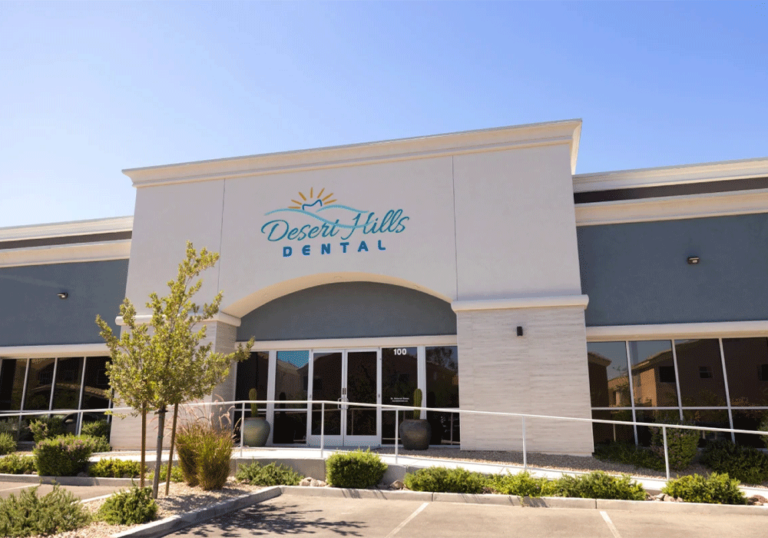Emergency Dental Care
Emergency Dentist in Las Vegas, NV
If you believe you are having a dental emergency, please contact us immediately at 702-736-7979 for a same-day dental appointment. If it is outside of our office hours, listed below, or we were unable to answer the phone, please leave a message, and we will return your call within a few hours.
Office Hours:
Monday: 7:00 a.m. – 4:00 p.m.
Tuesday: 7:00 a.m. – 4:00 p.m.
Wednesday: 7:00 a.m. – 4:00 p.m.
Thursday: 7:00 a.m. – 4:00 p.m.
Friday: 8:00 a.m. – 1:00 p.m.
Cost of a Dental Emergency
When it comes to paying for emergency dental care, we follow the same rules as regular visits. Check out our financial page for a rundown on the insurance we take, how you can pay, and everything else you need to know about financing your dental care.
Financial and Insurance Information
What is a Dental Emergency?
A dental emergency refers to any situation involving your teeth, gums, or mouth that requires immediate medical attention to relieve severe pain, stop bleeding, or save a tooth. Here are some common examples of dental emergencies:
- Severe Toothache: Persistent, intense pain that does not subside and may require immediate attention to relieve.
- Knocked-Out Tooth: If a tooth is completely dislodged from its socket, timely treatment can potentially save the tooth.
- Chipped or Broken Teeth: Especially if there is significant pain or damage to the tooth that exposes layers beneath the enamel.
- Loose or Dislodged Filling/Crown: If a filling or crown falls out or becomes loose, it can expose the tooth to infection and further damage.
- Abscess or Severe Infection: An abscess is a serious infection that occurs around the root of a tooth or in the space between the teeth and gums. It’s often painful and can even be life-threatening if not treated quickly.
- Bleeding Gums: While some bleeding might occur with flossing, excessive or uncontrollable bleeding from the gums can indicate a serious condition.
- Swelling in Mouth or Facial Area: Swelling can indicate an infection such as an abscess or other urgent conditions.
Immediate treatment for a dental emergency is crucial to alleviate pain, prevent further complications, and increase the chances of successful outcomes. In such cases, contacting a dentist as soon as possible is advised.
Home Care for Dental Emergencies
-
What if my tooth gets knocked out?
- Grasp the tooth by its crown (top part), avoiding the root.
- Lightly rinse the tooth with water only, steering clear of any soaps or chemicals. Avoid scrubbing it.
- Attempt to reinsert the tooth into its socket. Use gentle finger pressure, then try to stabilize it by biting down.
- If reinsertion isn’t feasible, store the tooth in a container filled with milk.
- Promptly get in touch with your dentist—the quicker you act, the better the chances for successful reimplantation.
-
What if my tooth is loose but still attached?
If you have a loose tooth, here’s what you should do:
- Avoid Touching It: Don’t wiggle the tooth with your tongue or fingers and avoid chewing on that side.
- Keep It Clean: Continue brushing and flossing gently, avoiding direct contact with the loose tooth.
- Eat Soft Foods: Stick to soft foods that don’t require much chewing.
- Saltwater Rinse: Rinse your mouth with warm salt water to reduce swelling and cleanse the area.
- See a Dentist: Visit a dentist as soon as possible for an evaluation and appropriate treatment, which might include stabilizing the tooth.
- Manage Pain: Use over-the-counter pain relievers if necessary, following the recommended dosage.
Prompt dental attention is essential to potentially save the tooth and address the underlying cause of its looseness.
-
What if I have a chipped or cracked tooth?
If you have a chipped or cracked tooth, start by rinsing your mouth with warm water to clean the area. Apply a cold compress to your cheek to reduce swelling and take over-the-counter pain relievers as needed. If you find pieces of the tooth, rinse and save them. Cover any sharp edges of the tooth with dental wax or sugar-free gum to prevent cuts. Stick to eating soft foods and avoid chewing on the affected side. Schedule a prompt dental appointment; bring any saved pieces of the tooth with you. Your dentist will evaluate the damage and recommend appropriate treatment, such as a filling, crown, or possibly a root canal for more severe cases. Immediate dental care is crucial to prevent further damage or infection.
